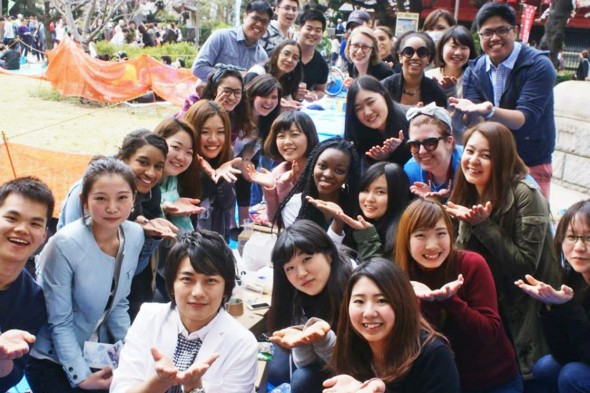Cultural experience of a lifetime

Raven Wells, a senior in English (center), studied in Japan. “My time abroad was unforgettable, to say the least,” says Wells, a Gilman scholarship recipient.
By Raven Wells
Raven Wells, a senior in English, received a Benjamin A. Gilman scholarship from the U.S. State Department to study abroad in Japan last spring.
I received a Snapchat not too long ago from my friend Yoshinori, a selfie taken under his desk, during class most likely, with the caption “Samui” — “cold” in Japanese.
It had been several months since I last saw him and other friends I met while studying abroad at Kanda University in Japan. Although it was October, I always debated that he was exaggerating about the weather in Tokyo compared to Chicago’s ever-changing weather we all love (loathe).
My time abroad in Chiba, the Oak Park of Tokyo, was unforgettable, to say the least. My interest in Japan was conceived through exposure to popular culture, such as anime or graphic novels known as manga, like “Naruto” (shout-out to those who stuck with reading all 700 chapters for 15 years). What was missing from my pre-departure experience was the culture behind the shows and books I loved. I could read all the manga I wanted, take Japanese classes, watch History Channel shows about Japan but nothing can beat living it. Living there.
The trains alone were impossible to navigate; the maps looked like a children’s coloring book with over 20 rails. And yes, they are crowded, but efficient, more so than a lifelong CTA rider could imagine.
Creating a routine while abroad was an exciting transition. Commuting to school for 30 minutes every day, plus 90 minutes once a week to my internship at Japanime Publishing Company; hanging my laundry to dry; finding a restaurant on a nameless street; saying “sumimasen,” or “Excuse me, I’m sorry,” all the time, just in case you think you did something impolite.
What I value most about being abroad is the connections I made. Fellow students like Yoshinori keep in contact with me daily. My supervisors have given me exposure to the innerworkings of a Japanese company and skills that make me more marketable in the U.S. Study abroad can enrich one’s résumé because many employers search to hire people with international experience.
By studying abroad and immersing myself in a culture that varies greatly from my own, I gained a greater sense of perspective toward issues back home in Chicago. Unfortunately, some students — many minority students — have written off the opportunity to experience the benefits of studying abroad.
Growing up on the South Side of Chicago, I was not exposed to many different types of people until I entered college. UIC gave me the opportunity to visit Japan and leave America for the first time. Once I applied to my program and was accepted, I realized I was one of two black students present at the pre-departure meeting of about 50 students.
Like many students, I rely on assistance from loans and merit scholarships to pay for my education, with no financial assistance from my family. Some students think studying abroad is unattainable due to financial limitations. It is also a fear for some black students that racism and micro-aggressions would be more severe while abroad than in the U.S. What’s important to consider about studying abroad are the benefits of doing so rather than reasons why not to go.
According to a study by the Association of International Educators, African-American students consisted of 14.5 percent of students enrolled in post-secondary education in 2011; however, they made up only 4.8 percent of those who studied abroad. There are resources available to students who wish to go abroad.
Gilman scholarships provide up to $5,000 to students with good grades and a strongly expressed desire to benefit from studying abroad. Programs such as International Education of Students match Gilman scholarships with additional financial assistance, as well as scholarships for underrepresented students. Boren, Fulbright and other scholarships also provide assistance for underrepresented groups.
With so much to gain from studying abroad, there’s little reason not to leave the cold of Chicago and explore the potential burning inside one’s self.

